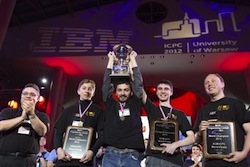St. Petersburg Student Programmers Win 'World's Smartest' Trophy
- By Dian Schaffhauser
- 05/22/12

Students from Russia's St. Petersburg State University of Information Technology, Mechanics & Optics won the title of World's Smartest at this year's International Collegiate Programming Contest. |
For five hours last week 112 university teams put their coding skills to work to vie for title of World Champions in the 2012 Association for Computing Machinery (ACM) International Collegiate Programming Contest. The "Battle of the Brains" programming challenge was tricky. Rather than creating programs that fit specific functional specs to generate the correct output, team participants had to develop a player that would compete in a game against other teams considering nine problems. According to a challenge overview, "Success is a result of developing and implementing a robust player with a sound strategy and correctly anticipating the strategies employed by one's opponents."
The teams had two weeks before the final challenge to develop their players. During that same period they could submit their player code and compete against opponents' players. Nightly updates of preliminary standings told them how they were doing. At the end of the coding phase, a double-elimination tournament determined the teams in the top four places.
Participants at the University of Warsaw-hosted event were culled from among 25,000 students who participated in regional contests around the world, each as part of a team of three.
The winners turned out to be three students from St. Petersburg State University of Information Technology, Mechanics & Optics in Russia.
How do universities create winning teams? "We recruit the best students," said U Warsaw coach Jan Madey in a video about the competition. U Warsaw's team won the competition in both 2003 and 2007 and took second place this year. "It's not enough to have three creative programmers. Each of them should a) be a good mathematician; b) [have] a good knowledge of algorithms; and c) be a very good programmer. Not only that, they have to be able to work together properly, to use the facts as a team, a team with limited resources. There might be a leader who is very fast at decisions; there might be someone who is very fast at typing; yet they should somehow be able to replace each other. So the best team is when each of them has a specialization plus they know how to work together."
Added player Wojciech Smietanka, "What I like about computer science is the possibility it gives to analyze and process a lot of data to solve hard problems to make computers serve us. And this is the thing that makes me crazy about computer science."
The champions have returned home with a "The World's Smartest Trophy," as well as a guaranteed offer of employment or internship with IBM, which sponsors the contest.
Moscow Institute of Physics & Technology and Shanghai's Jiao Tong University earned third and fourth places, respectively. All of the members of the top winning teams will receive job offers or internships. The top American finisher was Harvard University in seventh place.
There are three reasons IBM sponsors the programming competition, said Doug Heintzman, sponsorship executive: "The first is that these are the very best and brightest young people in the entire world, and we look forward to getting as many of them to become IBMers, to help us build the products to bring to market. The second is that we need them for the vitality of our entire industry. We need to encourage other people to pursue math and sciences in school. The third reason is that our planet faces very significant problems. We need to really get access to the best and brightest young elite problem solvers to help us build solutions for a smarter planet."
Next year's world finals will take place in St. Petersburg, Russia and will be hosted by this year's winners.
About the Author
Dian Schaffhauser is a former senior contributing editor for 1105 Media's education publications THE Journal, Campus Technology and Spaces4Learning.